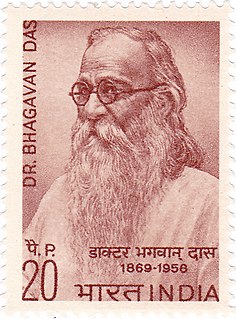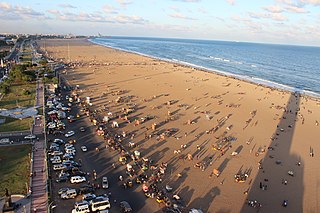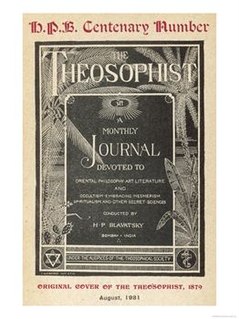
Bhagwan Das was an Indian Theosophist and public figure. For a time he served in the Central Legislative Assembly of British India. He became allied with the Hindustani Culture Society and was active in opposing rioting as a form of protest. As an advocate for national freedom from the British rule, he was often in danger of reprisals from the Colonial government. He was awarded the Bharat Ratna in 1955.

Adyar or Adayar is a large neighbourhood in south Chennai, Tamil Nadu, India. It is located on the southern banks of the Adyar River. It is bounded by the Buckingham Canal to the west, Tiruvanmiyur to the south, and Besant Nagar to the east. Adyar is one of the costliest areas in Chennai with property values four times the value of similar sized properties in the northern part of Chennai.
Daggubati Ramanaidu was an Indian film producer. He was the founder of Suresh Productions and has a place in the Guinness Book of World Records for the most films produced by an individual, having produced more than 150 films in 13 Indian languages. He also served as a member of parliament for the Bapatala constituency of Guntur District in the 13th Lok Sabha from 1999 to 2004.

Chennai, formerly known as Madras, is the capital of the state of Tamil Nadu and is India's fourth largest city. It is located on the Coromandel Coast of the Bay of Bengal. With an estimated population of 8.9 million (2014), the 400-year-old city is the 31st largest metropolitan area in the world.
The flora and fauna of Chennai are the plants and animals in Chennai, India.
The Madras Boat Club, located in the South of India, in the historic city of Chennai is one of the oldest rowing centres in India.

With its historic landmarks and buildings, long sandy beaches, cultural and art centers and parks, Chennai's tourism offers many potentially interesting locations to visitors. A notable tourist attraction in Chennai is actually in the neighbouring town of Mahabalipuram, with its ancient temples and rock carvings of the 7th century Pallava kingdom is an UNESCO World Heritage site
Dr. Muthulakshmi was an eminent medical practitioner, social reformer and Padma Bhushan awardee in India. She was the first female legislator in India.

George Sidney Arundale was a Theosophist, Freemason, president of the Theosophical Society Adyar and A bishop of the Liberal Catholic Church. He was the husband of the celebrated Indian dancer Rukmini Devi Arundale.

Curuppumullage Jinarajadasa was an author, occultist, freemason and theosophist. The fourth president of the Theosophical Society, Jinarajadasa was one of the world's foremost Theosophical authors, having published more than 50 books and more than 1600 articles in periodicals during his life. His interests and writings included religion, philosophy, literature, art, science and occult chemistry. He was also a rare linguist, who had the ability to work in many European languages.
Bahman Pestonji Wadia or Bomanji Pestonji Wadia was an Indian theosophist and labour activist. He was first a member of the TS Adyar, later of
the United Lodge of Theosophists. On 13 April 1918, along with V. Kalyanasundaram Mudaliar, Wadia founded the Madras Labour Union, one of India's first organised labour unions.

The Theosophist is the monthly journal of the international Theosophical Society based in Adyar, India. It was founded in India in 1879 by Helena Blavatsky, who was also its editor. The journal is still being published till date. For the year 1930, the journal was published in Hollywood, California by Annie Besant and Marie Russak Hotchener, but it returned to Adyar in 1931. The journal features articles about philosophy, art, literature and occultism.

Anna Salai, formerly known as St. Thomas Mount Road or simply Mount Road, is an arterial road in Chennai, India. It starts at the Cooum Creek, south of Fort St George, leading in a south-westerly direction towards St. Thomas Mount, and ends at the Kathipara Junction in Guindy. Beyond the Kathipara Junction, a branch road arises traversing westwards to Poonamallee to form the Mount-Poonamallee Road while the main branch continuing southwards to Chennai Airport, Tambaram and beyond to form Grand Southern Trunk Road. Anna Salai, which is more than 400 years old, is acknowledged as the most important road in Chennai city. The head offices of many commercial enterprises and public buildings are located along Anna Salai. It is the second longest road in Chennai, after Poonamallee High Road.
The Madras Presidency Matches were annual first-class cricket matches played in Madras from the 1915–16 season to 1951–52 between the cricket teams of Indians and the Europeans. The matches were played in the Chepauk Grounds usually in mid-January around the time of Pongal festival. They were sometimes called the Pongal Matches because of this. Of the 33 matches played, Indians won 15 and the Europeans 8 with 10 draws.
Cholamandal Artists' Village, established in 1966, is the largest artists' commune in India. Its artists are credited for the Madras Movement of Art (1950s–1980s), which brought modernism to art in South India. Their work is widely recognized as some of the best art produced in postwar India and is shown regularly in galleries across the country. Several Cholamandal artists have also shown in Europe, the United States and South America.

The Adyar or Adayar, originating near the Chembarambakkam Lake in Kanchipuram district, is one of the three rivers which winds through Chennai (Madras), Tamil Nadu, India, and joins the Bay of Bengal at the Adyar Estuary. The 42.5-kilometre (26.4 mi) long river contributes to the estuarine ecosystem of Chennai. Despite the high pollution levels, boating and fishing take place in this river. The river collects surplus water from about 200 tanks and lakes, small streams and the rainwater drains in the city, with a combined catchment area of 860 square kilometres (331 sq mi). Most of the waste from the city is drained into this river and the Cooum.

The First Carnatic War (1746–1748) was the Indian theatre of the War of the Austrian Succession and the first of a series of Carnatic Wars that established early British dominance on the east coast of the Indian subcontinent. In this conflict the British and French East India Companies vied with each other on land for control of their respective trading posts at Madras, Pondicherry, and Cuddalore, while naval forces of France and Britain engaged each other off the coast. The war set the stage for the rapid growth of French hegemony in southern India under the command of French Governor-General Joseph François Dupleix in the Second Carnatic War.
The Battle of Adyar or
Battle of Mailapur took place on 24 October 1746. The battle was between the French East India Company men and Nawab of Arcot forces over the St. George Fort, which was held by the French. It was part of the First Carnatic War between the English and the French.

Healthcare in Chennai is provided by both government-run and private hospitals. Chennai attracts about 45 percent of health tourists from abroad arriving in the country and 30 to 40 percent of domestic health tourists. The city has been termed India's health capital. Multi- and super-specialty hospitals across the city bring in an estimated 150 international patients every day. Factors behind the tourists' inflow in the city include low costs, little to no waiting period, and facilities offered at the speciality hospitals in the city.
















